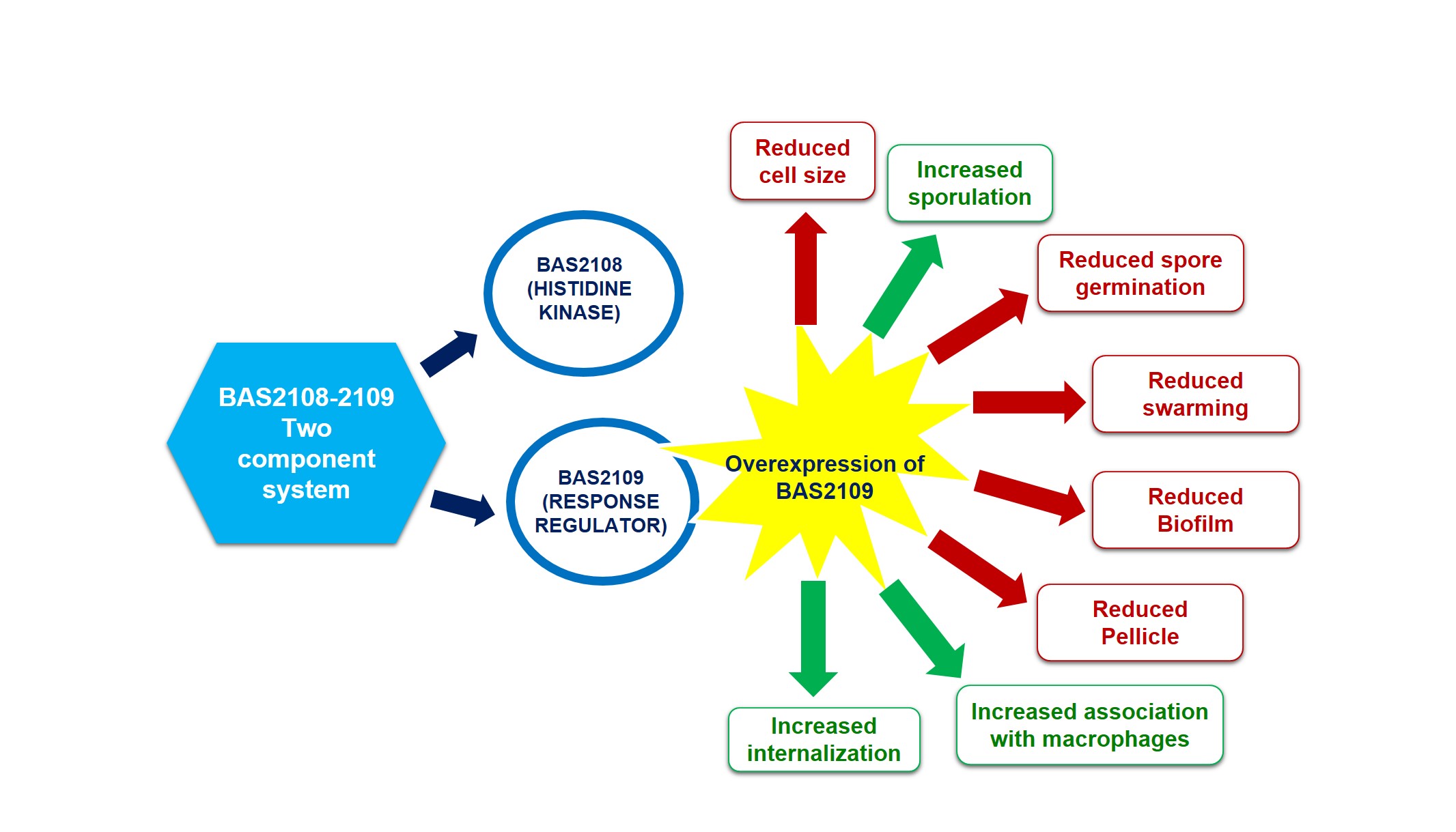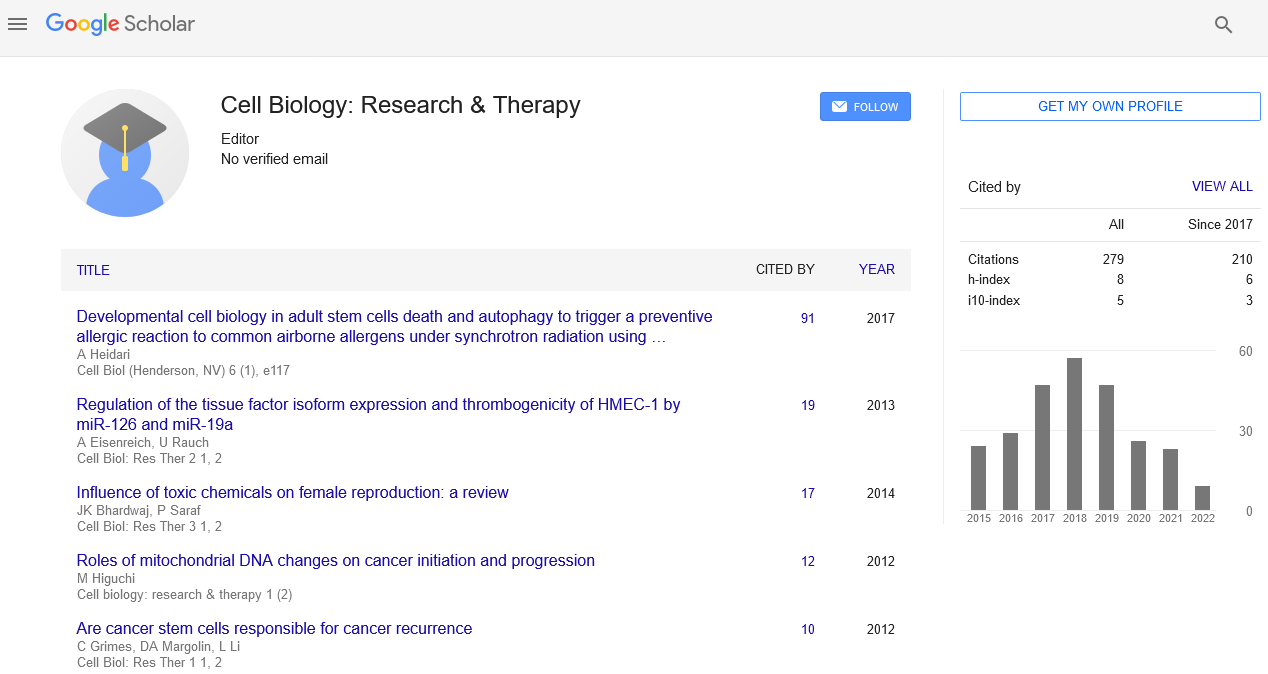About the Cell Biology: Research & Therapy

Cell Biology: Research & Therapy (CBRT) is a peer-reviewed scholarly journal that aims to publish the most complete and reliable source of information on the discoveries and current developments in the field of cell biology. Articles of various forms such as original articles, review articles, case reports, short communications, etc. in all areas of cell biology research.
Cell Biology: Research & Therapy focuses on the topics include:
- Cell Anatomy
- Cell Physiology
- Cell Structure
- Cell Movement
- Cell Signalling (Lipid and Protein Signalling)
- Signal Transduction
- Cell Differentiation
- Cell Genetics
- Stem Cell Biology
- RNA Biology
- Neurocellular Biology
- Cell Cancer
- Autophagy
- Cell Transplantation
- Cell Therapy
Review processing is performed by the Editorial Board members of the Journal or outside experts; at least two independent reviewers approval followed by editor approval is required for acceptance of any citable manuscript. Authors may submit manuscripts and track their progress through the system, hopefully to publication. Reviewers can download manuscripts and submit their opinions to the editor. Editors can manage the whole submission/review/revise/publish process.
Submit your manuscript at Online Submission System and through an e-mail attachment to the Editorial Office at publisher@scitechnol.com.
Apoptosis:
Apoptosis is a process of programmed cell death that occurs in multicellular organisms. Biochemical events lead to characteristic morphological changes and death. Apoptosis plays an integral role to maintaining an equilibrium with the new cells being formed. It is also important in maintaining the regular functions and activities of cells.
Cell Regeneration:
Cell regeneration is the science in which the procedure of re-establishment, reclamation and development that makes genomes, cells, living beings and biological systems. Cell regeneration is a characteristic changes or occasions that cause aggravation or harm.
Cell Cloning:
In science, cell cloning is the procedure of creating comparative populaces of cells hereditarily indistinguishable people that happens in nature when organic entities, for example, microorganisms, creepy crawlies or plants duplicate asexually.
Cell Morphological and Functional Studies:
Cell Morphological and Functional Studies is a branch of biology dealing with the study of the form and structure of organisms and their specific structural features. Include aspects of external appearance and functionality studies.
Cellular Pathology:
Cellular pathology is an indicative administration that takes a diagnostic look at cells of the body from either tissues or liquids. Diagnostic look of the cells give us an impression, how they have created and how they are working.
Embryotic Cell Studies:
Embryonic stem cells (ES cells) are pluripotent immature cell mass got from the inner cell mass of a blastocyst, an early-arrange pre-implantation fetus. Embryonic stem cells, derived from the blastocyst stage of early mammalian embryos.
Cell Developmental Biology:
Cell Developmental Biology is the study of the procedure by which animals and plants develop and create, and is synonymous with ontogeny. Cell Developmenetal Biology involves recovery, abiogenetic multiplication and transformation.
Transplantation Studies:
Cell transplantation is one type of cell therapy were we can replace the damaged cells with the healthy cells by using various methods. For example, bone marrow transplant, It is also called as stem cell transplant, it is a procedure that infuses healthy cells, called stem cells, into your body to replace damaged or diseased bone marrow. A bone marrow transplant may also be used to treat certain types of cancer.
Cytoskeleton Studies:
The cytoskeleton is an intracellular framework that backings cell shape and capacity. Cytoskeleton studies is the network of a dynamic structure made out of three primary proteins, which are fit for fast get together or dismantling dependent on the cell's prerequisites.
Epigenetics:
Epigenetics is the study, in the field of genetics, of cellular and physiological phenotypic trait variations that are caused by external or environmental factors that switch genes on and off and affect how cells read genes instead of being caused by changes in the DNA sequence. Examples of epigenetics are DNA methylation and histone modification, each of which alters how genes are expressed without altering the underlying DNA sequence.
Neurobiology:
Neurobiology is the study of cells of the nervous system and the organization of these cells into functional circuits that process information and mediate behavior. It is a sub discipline of both biology and neurosciences. It mainly focuses on the molecular and cellular studies of individual nerve cells to imaging of sensory and motor tasks in the brain.
Cellular Signalling:
Cell signalling is a piece of a complex arrangement of correspondence that oversees essential cell exercises and directions cell activities. The capacity of cells to see and accurately react to their micro-environment.
Somatic Cell Studies:
Somatic cell studies is the biological cell forming the body of an organism; that is, in a multicellular organism, any cell other than a gamete, germ cell, gametocyte or undifferentiated stem cell.
Cellular DNA studies:
Deoxyribonucleic acid (DNA) is a molecule that carries the genetic instructions used in the growth, development, functioning and reproduction of all known living organisms and many viruses. DNA studies works with the function of the DNA and its applications such as cell division, molecular biology studies of the Cellular DNA.
Cell Membrane and Cell Wall Studies:
Membrane Biology deals with the various features and functions of the cell membrane and cell wall. In Cell Memberane and cell wall the chemical composition and salient features are studies thoroughly providing an insight into the development of the cell.
Cell Orgnanelles:
Cell organelles and components gives includes the various vital components of the cell such as mitochondria, ribosomes, endoplasmic reticulum, chloroplast, nucleus etc. Cell Organelles and Components play a vital role in the functioning and working of the cell.
Cell Syntheis:
Cell synthesis involves the synthesis of various proteins and chemicals that are vital for the development and functioning of the cell. Cell synthesis is essential for the growth and development of the cell.
Cellular Dynamics:
Cellular dynamics studies the dynamics reaction shown by the cell during various processes. In cellular dynamcisThe reaction shown by the components of the cell during various process such as cell differentiaion and implications on cell functions are studied in cellular dynamics.
Cell Motility:
Cell Motility studies the various features of the cell during motility and how the components of the cell react to it. Cell differentiation is the process by which the cells increase their number.
Journal Impact Factor:
2016 Journal Impact Factor is the ratio of the number of citations achieved in the year 2016 based on Google Search and Google Scholar Citations to the total number of articles published in the last two years i.e. in 2014 and 2015. Impact factor measures the quality of the Journal.
If ‘X’ is the total number of articles published in 2014 and 2015, and ‘Y’ is the number of times these articles were cited in indexed journals during 2016 then, impact factor = Y/X.
Fast Editorial Execution and Review Process (FEE-Review Process):
Cell Biology: Research & Therapy is participating in the Fast Editorial Execution and Review Process (FEE-Review Process) with an additional prepayment of $99 apart from the regular article processing fee. Fast Editorial Execution and Review Process is a special service for the article that enables it to get a faster response in the pre-review stage from the handling editor as well as a review from the reviewer. An author can get a faster response of pre-review maximum in 3 days since submission, and a review process by the reviewer maximum in 5 days, followed by revision/publication in 2 days. If the article gets notified for revision by the handling editor, then it will take another 5 days for external review by the previous reviewer or alternative reviewer.
Acceptance of manuscripts is driven entirely by handling editorial team considerations and independent peer-review, ensuring the highest standards are maintained no matter the route to regular peer-reviewed publication or a fast editorial review process. The handling editor and the article contributor are responsible for adhering to scientific standards. The article FEE-Review process of $99 will not be refunded even if the article is rejected or withdrawn for publication.
The corresponding author or institution/organization is responsible for making the manuscript FEE-Review Process payment. The additional FEE-Review Process payment covers the fast review processing and quick editorial decisions, and regular article publication covers the preparation in various formats for online publication, securing full-text inclusion in a number of permanent archives like HTML, XML, and PDF, and feeding to different indexing agencies.
 Spanish
Spanish  Chinese
Chinese  Russian
Russian  German
German  French
French  Japanese
Japanese  Portuguese
Portuguese  Hindi
Hindi 

